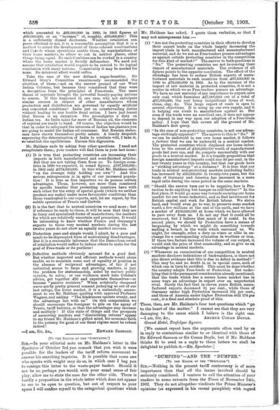[To THE EDITOR OP THE "SPECTATOR."] SIR,—In your editorial note
on Mi. Haldane's letter in the Spectator of 'October 3rd you remark that you wish it were possible for the leaders of the tariff reform movement to answer his searching inquiries. It is possible that some one who speaks with weight may do so, in which case I beg you to consign this letter to the waste-paper basket. Should it not be so, perhaps you would, with your usual sense of fair play, allow me to state the case for the other side. There is liardly a proposition in the whole letter which does not appear to me to be open to question, but out of respect to your space I will confine myself to the categorical questions which Mr. Haldane has asked. I quote them verbatim, so that I may not misrepresent him :- (1) "Are not the protecting countries in their efforts to develop their export trade on the whole largely increasing the import trade in both manufactured and unmanufactured material, and do we not as Free-traders possess advantages as against outside protecting countries in the competition for this kind of market?" The answer to both questions is " No." The protecting countries are not increasing their import of manufactured materials. The evidence of all figures points to the opposite conclusion. The effect of the shrinkage has been to reduce British exports of manu- factured materials to such countries from £87,000,000 in 1880 to 476,000,000 in 1902. As to the increase of the import of raw material in protected countries, it is not a matter in which we as Free-traders possess an advantage. We have no raw material of any importance to export, save only coal, which furnishes 227,000,000 out of a total of £31,000,000, the rest being insignificant items of wool, china, clay, &c. This large export of coals is open to several objections. It is using up our own supply, and it is helping our rivals to manufacture against us. But even if the trade were an excellent one, it does not appear to depend in any way upon our adoption of a Free-trade . policy. I hope that this covers all the ground of Mr. Haldane's first query.
(2) "In the case of non-protecting countries, is not our advan- tage strikingly apparent ?" The answer to this is "No." If we can be undersold in our own home market, it follows a fortiori that we can be undersold in a neutral market. The protected countries which displaced our home indus- tries to the extent of £100,000,000 worth of manufactured goods last year can, and do, compete successfully with our goods in a neutral market. Is it a tenable proposition that foreign manufactured imports could rise 50 per cent. in the last twenty years in this country, but that our goods have a " striking advantage" at a distance ? It is true that our trade in neutral non-protecting markets (excluding India) has increased by £33,000,000 in twenty-two years, but the trade of Germany and America has increased in a more rapid ratio during the same period in the same markets.
" Should the answer turn out to be negative, how is Pro- tection to do anything but hamper us still further ?" In the first place, it would go some way towards securing our home market for our home industries, and so find investment for British capital and work for British labour. We strive hard, and would even go to war, to preserve some market worth a few millions at the end of the earth, and we have a market of £100,000,000 at home which we have allowed to pass away from us. I do not say that it could all be recovered, but I believe that much of it could. In the second place, we should by Protection. have a means of bargaining by which we might do something towards making a breach in the walls which surround us. We might, for example, relax a duty on wines or silks in ex- change for a, corresponding relaxation in woollens or iron.. If these two factors increased the volume of our output, it would sink the price of that commodity, and so give us an advantage in neutral markets.
" Whenever an examination of our competition in neutral markets discloses indications of backwardness, is there not also direct evidence that this is due to defect in method.? ". This may be, and no doubt is, so in special cases, each of which can in turn be rectified. This must be done whether the country adopts Free-trade or Protection. But under; lying that is the permanent consideration already mentioned, that the trade which has a secure home market has in- some ways an advantage in export over an unprotected rival. Surely the fact that in eleven years British manu- factured exports decreased 84 per cent., while those of Germany under high Protection increased 35* per cent., and those of America under higher Protection still 174 per cent., is a final and absolute proof of this.
These, then, are Mr. Haldane's four test questions which "go. to the heart of the matter." I cannot see that they are very damaging to the cause which I believe is the right one.
—I am, Sir, &c., ARTHUR CONAN DOYLE. Grand Hotel, Trafalgar Square.
[We cannot repeat here the arguments often used by us in reply to contentions similar to or identical with those of Sir Edward Sassoon or Sir Conan Doyle, but if Mr. Haldane thinks fit to send us a reply to these letters we shall -be delighted to publish it. —En. Spectator.]














































 Previous page
Previous page